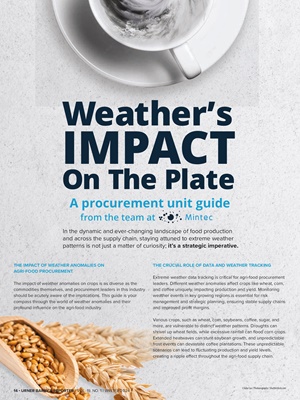
14 • URNER BARRY'S REPORTER / VOL. 19, NO. 1 / WINTER 2024
Weather's
IMPACTOn The Plate
A procurement unit guide
from the team at
In the dynamic and ever-changing landscape of food production
and across the supply chain, staying attuned to extreme weather
patterns is not just a matter of curiosity; it's a strategic imperative.
THE IMPACT OF WEATHER ANOMALIES ON
AGRI-FOOD PROCUREMENT
The impact of weather anomalies on crops is as diverse as the
commodities themselves, and procurement leaders in this industry
should be acutely aware of the implications. This guide is your
compass through the world of weather anomalies and their
profound influence on the agri-food industry.
THE CRUCIAL ROLE OF DATA AND WEATHER TRACKING
Extreme weather data tracking is critical for agri-food procurement
leaders. Different weather anomalies affect crops like wheat, corn,
and coffee uniquely, impacting production and yield. Monitoring
weather events in key growing regions is essential for risk
management and strategic planning, ensuring stable supply chains
and improved profit margins.
Various crops, such as wheat, corn, soybeans, coffee, sugar, and
more, are vulnerable to distinct weather patterns. Droughts can
shrivel up wheat fields, while excessive rainfall can flood corn crops.
Extended heatwaves can stunt soybean growth, and unpredictable
frost events can devastate coffee plantations. These unpredictable
scenarios can lead to fluctuating production and yield levels,
creating a ripple effect throughout the agri-food supply chain.
©Julia Lav / Photoongraphy / Shutterstock.com